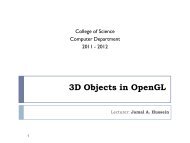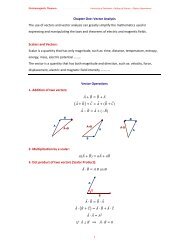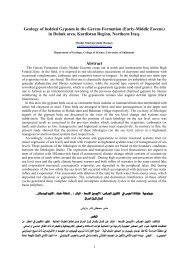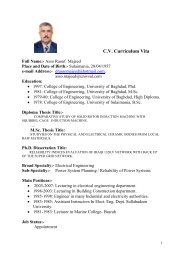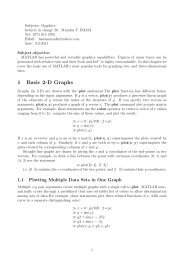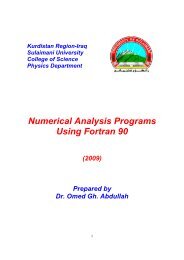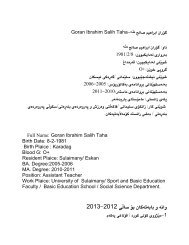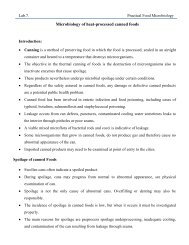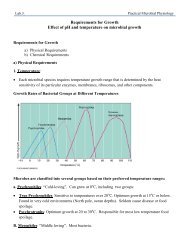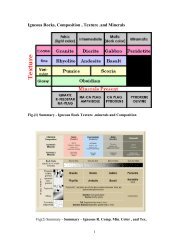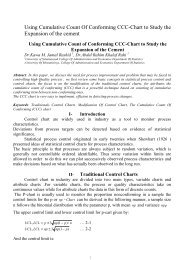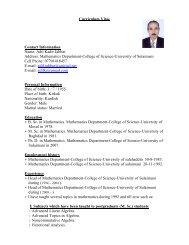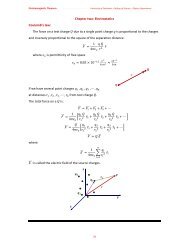Grammatical Aspect in English and Kurdish - University of Sulaimani
Grammatical Aspect in English and Kurdish - University of Sulaimani
Grammatical Aspect in English and Kurdish - University of Sulaimani
You also want an ePaper? Increase the reach of your titles
YUMPU automatically turns print PDFs into web optimized ePapers that Google loves.
There are different views on aspect by different grammarians, among<br />
them, for example, is Hartmann <strong>and</strong> Stork’s view, who def<strong>in</strong>e aspect as “a<br />
grammatical category <strong>of</strong> the verb marked by prefixes, suffixes or <strong>in</strong>ternal<br />
vowel changes <strong>in</strong>dicat<strong>in</strong>g not so much its location <strong>in</strong> the (-tense) but the<br />
duration <strong>and</strong> type <strong>of</strong> the action expressed” (1972:20).<br />
Comrie (1976:3) states that “aspects are different ways <strong>of</strong> view<strong>in</strong>g<br />
the <strong>in</strong>ternal temporal consistuency <strong>of</strong> a situation”. While Smith (1976:61)<br />
has an <strong>in</strong>terest<strong>in</strong>g view on aspect <strong>in</strong> his “camera- metaphor”, he mentions<br />
that “aspectual viewpo<strong>in</strong>ts function like the lens <strong>of</strong> a camera, mak<strong>in</strong>g<br />
objects visible to the receiver. Situations are the objects on which<br />
viewpo<strong>in</strong>ts lenses are tra<strong>in</strong>ed”. Quirk et al. (1985:188) <strong>and</strong> Greenbaum<br />
<strong>and</strong> Quirk (1990:51) view aspect as “a grammatical category which<br />
reflects the way <strong>in</strong> which the verb is regarded or experienced with respect<br />
to time”. Crystal def<strong>in</strong>es aspect as “a category used <strong>in</strong> the grammatical<br />
analysis <strong>of</strong> verbs (along with tense <strong>and</strong> mood) referr<strong>in</strong>g primarily to the<br />
way the grammar marks the duration or type <strong>of</strong> temporal activity denoted<br />
by the verb” (1991:27).<br />
While Gramely <strong>and</strong> Patzold (1992:146) expla<strong>in</strong> that aspect is not<br />
concerned with relat<strong>in</strong>g the time <strong>of</strong> the situation to any other time po<strong>in</strong>t,<br />
but rather with the <strong>in</strong>ternal temporal consistuency <strong>of</strong> the situation”.<br />
Richards et al (1992:22) identify aspect as that “grammatical<br />
category which deals with how the event described by a verb is viewed such<br />
as it is <strong>in</strong> progress, habitual, repeated, momentary, etc.” He also mentions<br />
that aspect may be <strong>in</strong>dicated by prefixes, suffixes or other categories <strong>of</strong> a<br />
verb.<br />
Trask (1993:21) describes aspect as “a grammatical category<br />
which relates to the <strong>in</strong>ternal temporal structure <strong>of</strong> a situation”.<br />
The above def<strong>in</strong>itions emphasize the relationship between aspect <strong>and</strong><br />
the duration <strong>of</strong> the action denoted by the verb. Among all these def<strong>in</strong>itions,<br />
the def<strong>in</strong>ition by Comrie is the most comprehensive. It draws a clear<br />
dist<strong>in</strong>ction between ‘aspect’ <strong>and</strong> ‘tense’. One can realize the difference<br />
between situation-<strong>in</strong>ternal time (aspect) <strong>and</strong> situation-external time (tense).<br />
From these it can be concluded that aspect refers to the <strong>in</strong>ternal<br />
temporal consistuency <strong>of</strong> an event or the manner <strong>in</strong> which the action <strong>of</strong> the<br />
verb is distributed through the time-space cont<strong>in</strong>uum. Tense, on the other<br />
h<strong>and</strong>, refers to the location <strong>of</strong> an event <strong>in</strong> the cont<strong>in</strong>uum. However, only<br />
Hartmann <strong>and</strong> Stork (1972:20) pay attention to the form or the structural<br />
aspect <strong>of</strong> ‘aspects’. They expla<strong>in</strong> that verbs change their forms by receiv<strong>in</strong>g<br />
prefixes, suffixes or <strong>in</strong>ternal vowel changes so as to denote the duration <strong>of</strong><br />
an action.<br />
2. The Notion <strong>of</strong> Time, Tense, <strong>and</strong> <strong>Aspect</strong>:<br />
It can be noticed that ‘aspect’ does not occur alone but it always<br />
occurs with ‘tense’. They relate the happen<strong>in</strong>g described by the verb to<br />
time <strong>in</strong> the past, present, or future (Leech <strong>and</strong> Svartvik 1994:65). <strong>Aspect</strong> is<br />
a difficult concept to grasp because it tends to conflate with the concept <strong>of</strong><br />
tense.<br />
The term ‘tense’ is related to the l<strong>in</strong>guistic expression <strong>of</strong> time<br />
21<br />
BÑoÐG+/--6Òg?i@Ô+%/2&Ïg@½e+ÑÁ@¾â̺kÒÙÁ?iÒg@¡Ù}



